Benjamin Burnley on guitar synths, ESP and overcoming his fears to take Breaking Benjamin around the world
"We give 100 per cent of ourselves to our fans… because they would do the same for us"
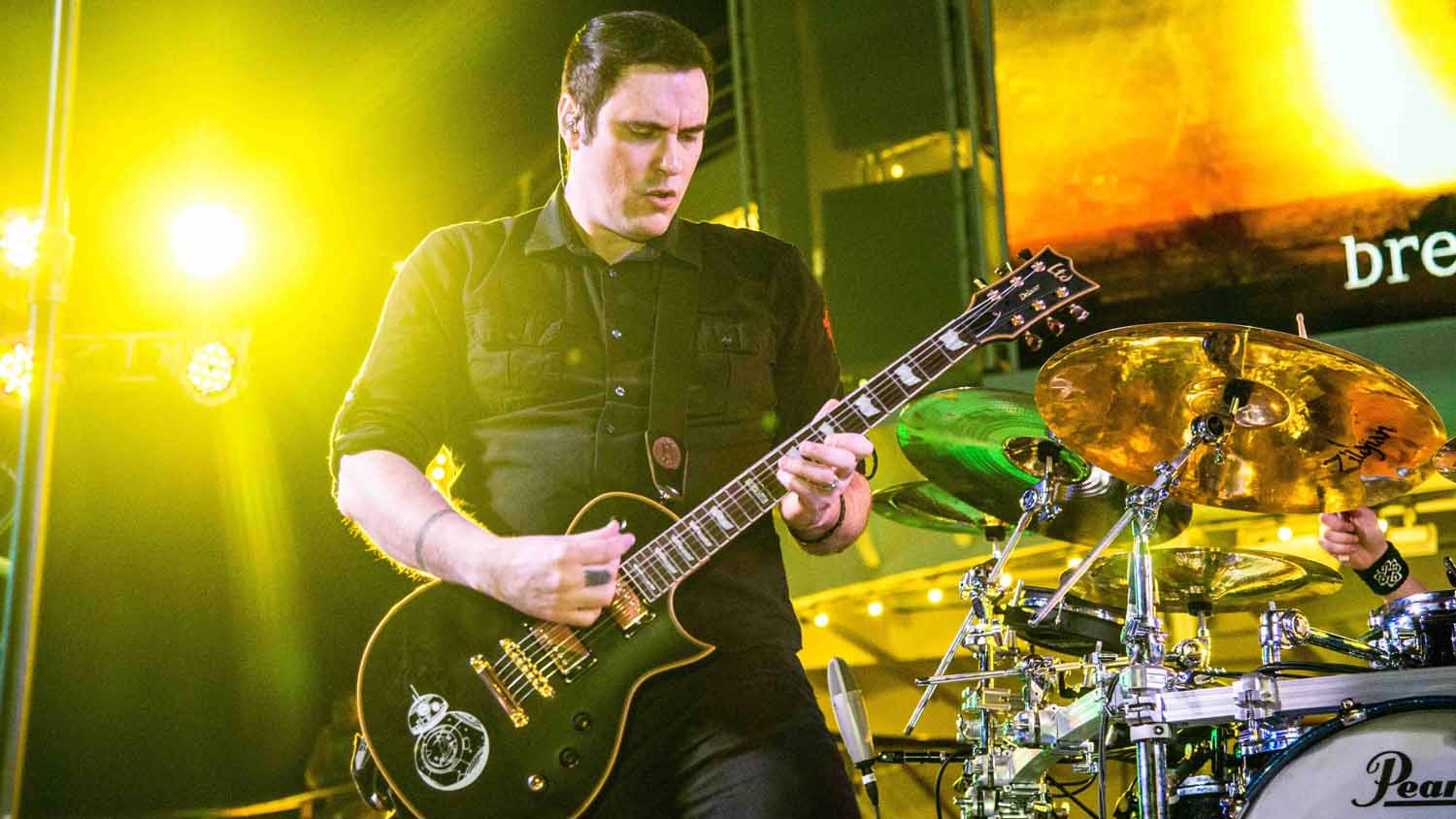
Introduction: shipping out
For most American bands, a trip to Europe can be done over the course of a day - an afternoon, even, departing from the East Coast.
For Pennsylvanian radio rock titans Breaking Benjamin, a journey across the Atlantic takes almost a week-and-a-half, which is precisely why this year’s European summer tour marks their first jaunt across the pond - despite having topped their native charts and selling millions since forming in 1999.
In the wake of last year’s post-hiatus album Dark Before Dawn’s critical success, founding singer/guitarist Benjamin Burnley decided it was time to face his fears.
It took nine days on a cruise ship to get here
“I came on the RMS Queen Mary 2,” he deadpans. “No. Seriously. It took nine days on a cruise ship to get here [London]. Here, look at the pictures on my phone [opens camera roll]: here’s me getting on, then here’s me coming off nine days later.”
If you look at the cover of Breaking Benjamin’s 2006 album Phobia, you’ll see a man outstretching his wings on a runway. Better still, stick the CD on and you’ll hear a flight attendant echoing over their minor riffs and the sound of a jet engine during takeoff.
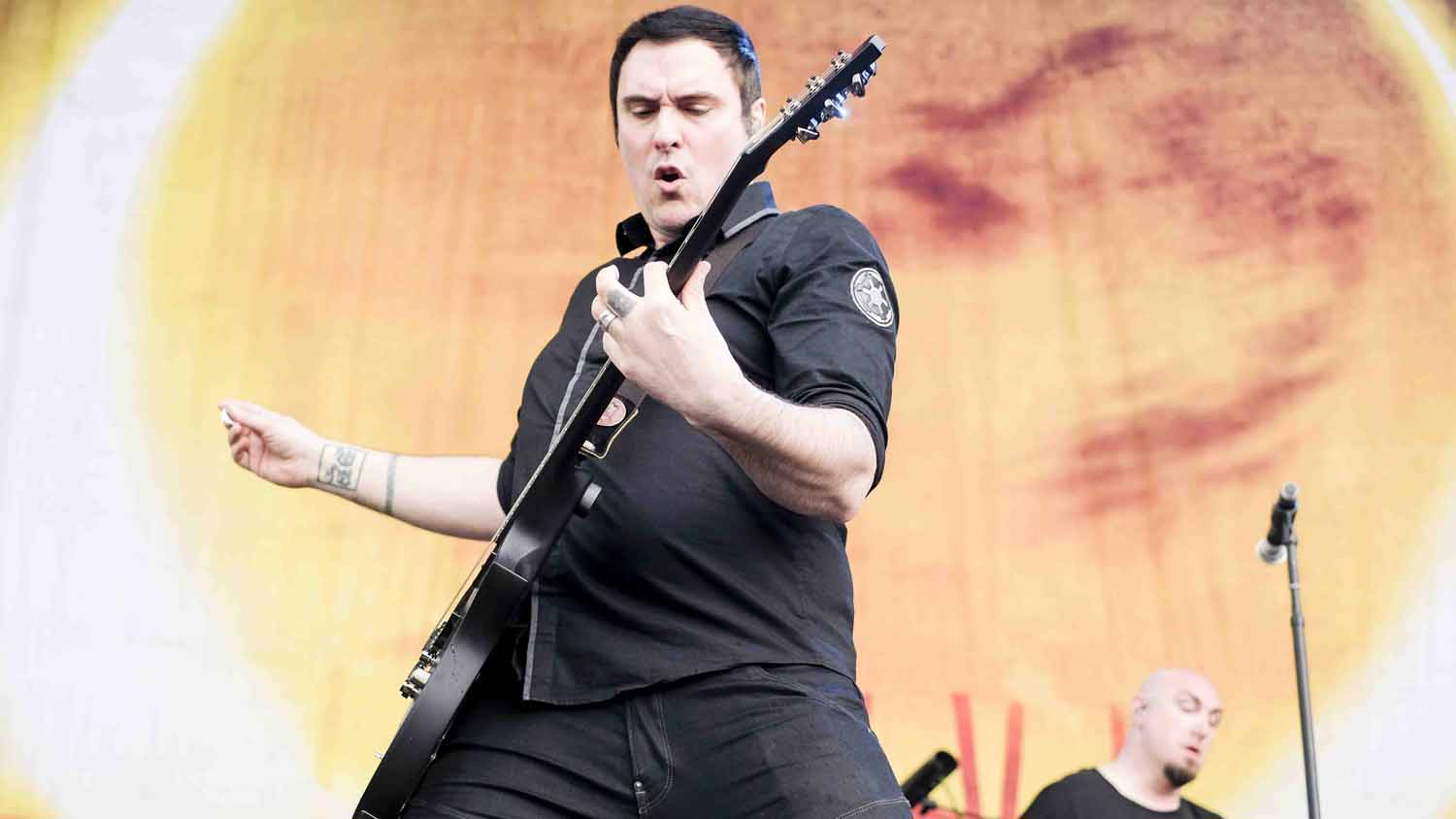
Cruise control
Burnley may not be the first rock star with a fear of flying, but he’s certainly one of the most prolific musicians in history to refuse the tin-can express. Not to say nine-and-a-half days on a boat was a particularly riveting experience, either…
“I’m still sober these days, so I couldn’t drink the sea sickness away… or increase it,” he laughs. “Everyone who drank on the cruise vomited. The journey sucked, so I’m glad to be here. I would do it again if it means I get to play. And I will.”
That ship ride really did suck. That’s how much we love our fans
“There were loads of old people on the boat and a medical emergency one hour into the ride, meaning we had to turn around! There was even a morgue on the ship. It was a classic cruise, so I wore a jacket and got loads of selfies with old people in the background. So, yeah, I can only come here by ship…”
If you’re reading this in Japan and wondering whether Breaking Benjamin will ever make it that far, there’s hope for you yet…
“For Asia, I’ll try to arrange going from one place to the next,” he ponders. “Going straight from America to Japan would be impossible, but say if we piggyback and hop around Europe, it could be possible. But that ship ride really did suck. That’s how much we love our fans.”
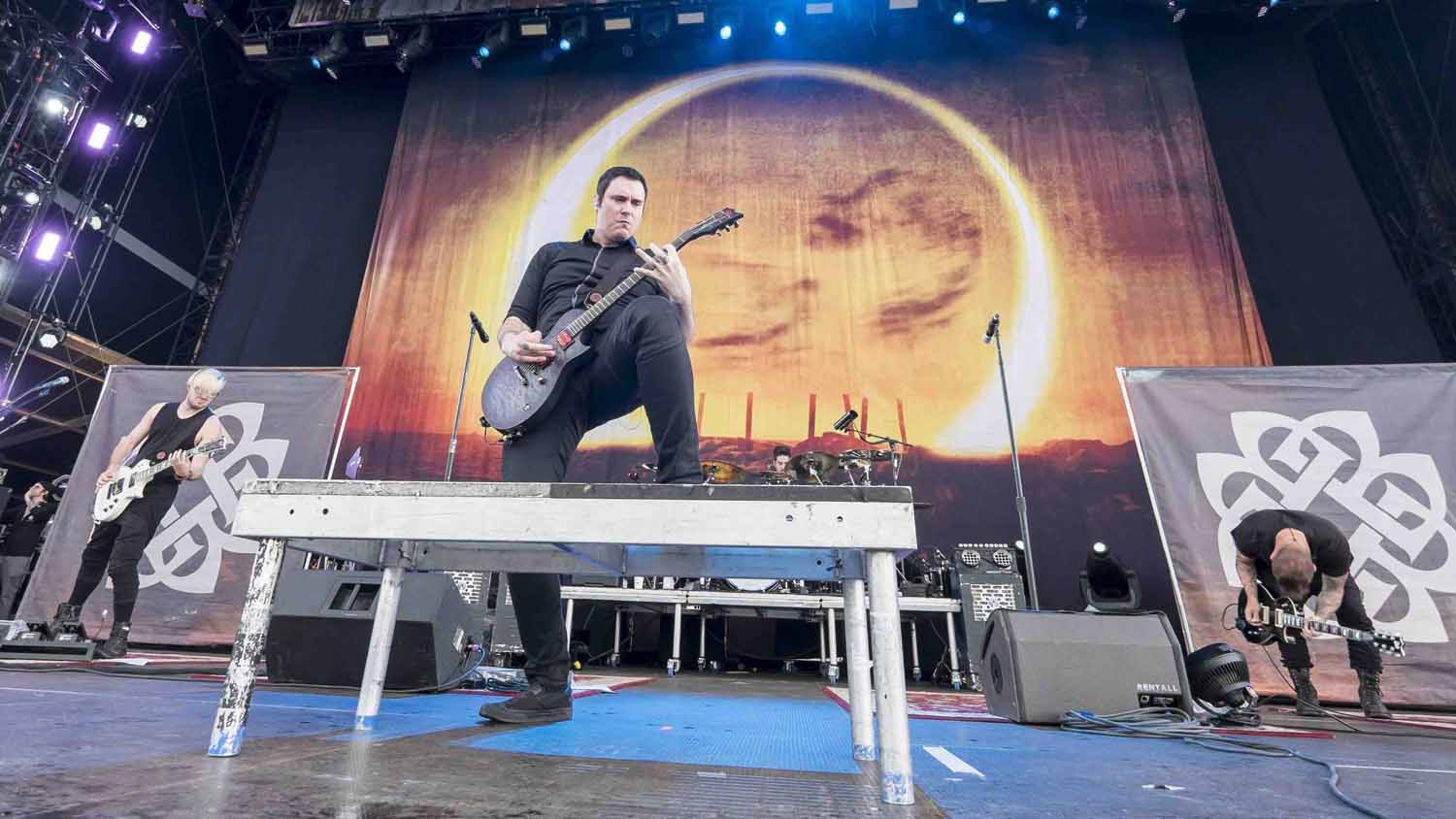
A multitude of synth
Last year’s Dark Before Dawn, the first album to feature this current Breaking Benjamin line-up - which includes fellow guitarists Jasen Rauch and Keith Wallen - has clearly reinvigorated their leader’s thirst for music.
Perhaps the welcome change of working with different musicians and finally topping their native Billboard charts after a fair few silver medals were jointly responsible for this new lease of life…
We don’t play to a click, which is kinda rare for a band to say these days!
“The guys in the band are the reason why we’re all here,” smiles Benjamin, before adding, “I think live is where that translates the most. First, there’s an extra member now with five in the band, which includes backing singers that can actually sing. And now we trigger everything real-time. We don’t play to a click, which is kinda rare for a band to say these days!
“Everything that’s done, we do ourselves in realtime with a pad or guitar synthesizer. It turns the guitar into MIDI, which enables you to play strings on guitar. Which works great! We use the Roland GR-55 pedal, and all you do is mount the pickup onto a regular guitar, which allows you to play string parts in real-time. No backing tracks, no keyboard… it’s all guitar!”
Indeed, it’s their openness to the wonders of modern technology that’s allowed Breaking Benjamin to bring their sound into the future. The same philosophy is applied to amplification - their weapon of choice? The Fractal Audio Axe-Fx II, of course.
The GR-55 can make synth sounds, weird jazz orchestras, all sorts of things - it’s pretty much limitless
“We took a step forward in modernisation,” reveals Benjamin of his new favourite gadget. “Now we don’t even have amps; we use the Axe-Fx II. It’s a nightmare sometimes getting that to do exactly what you want, because you can do pretty much everything.
“It’s a ridiculous piece of machinery - we run it in stereo and split that in half. Our other guitarist Jasen Rauch splits his GR-55 through the Axe-Fx II; you can use it like a mute or add more effects.
"On the track Failure, we have a dynamic setting that changes depending how hard we pick. The GR-55 can make synth sounds, weird jazz orchestras, all sorts of things - it’s pretty much limitless…”
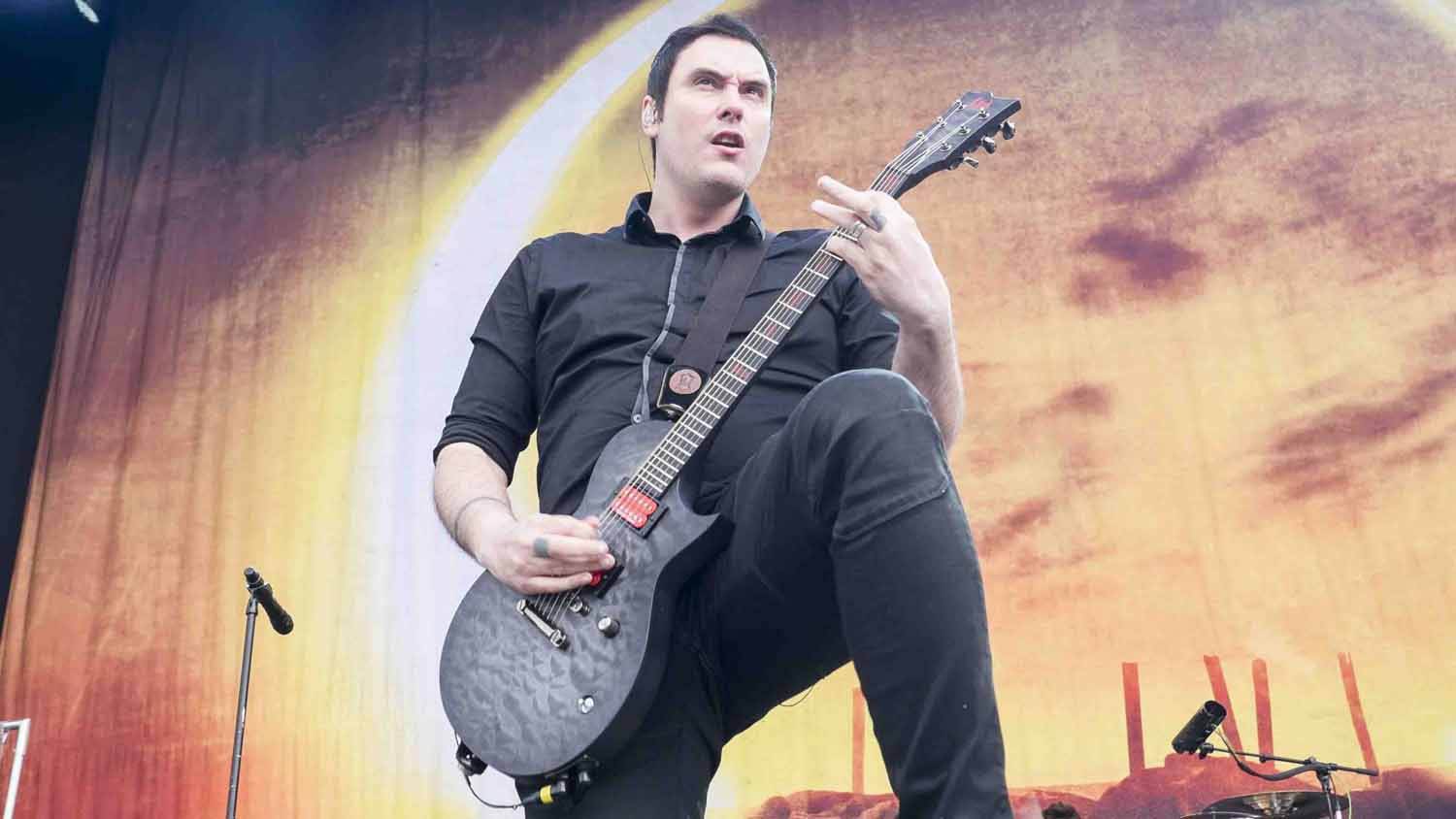
Endorsement blues
As for the instrument in his hands, Benjamin continues to trust in his signature ESP. Though the story behind their continued partnership remains somewhat serendipitous.
“I have a Custom ESP with Seymour Duncans loaded into it. The guitar is baritone scale, not regular, and I’ve been using those for a while… How do I diplomatically put this? My old guitar company wanted me to pay for my customs to get made. They weren’t interested or were unable to facilitate what I needed without me having to pay for it.
If I’m going to have to f**king pay for something, then I’m just gonna use whatever the f**k I wanna use
“Basically, as an artist, if I’m going to have to fucking pay for something, then I’m just gonna use whatever the fuck I wanna use,” he rants. “Endorse me and I’ll only play just that and stay solely with you… if I have to pay, then why don’t I use whatever the hell I want?
“ESP is a great brand, I’ve always loved them, known for well-made guitars that sound great, feel great… and they take care of us!”
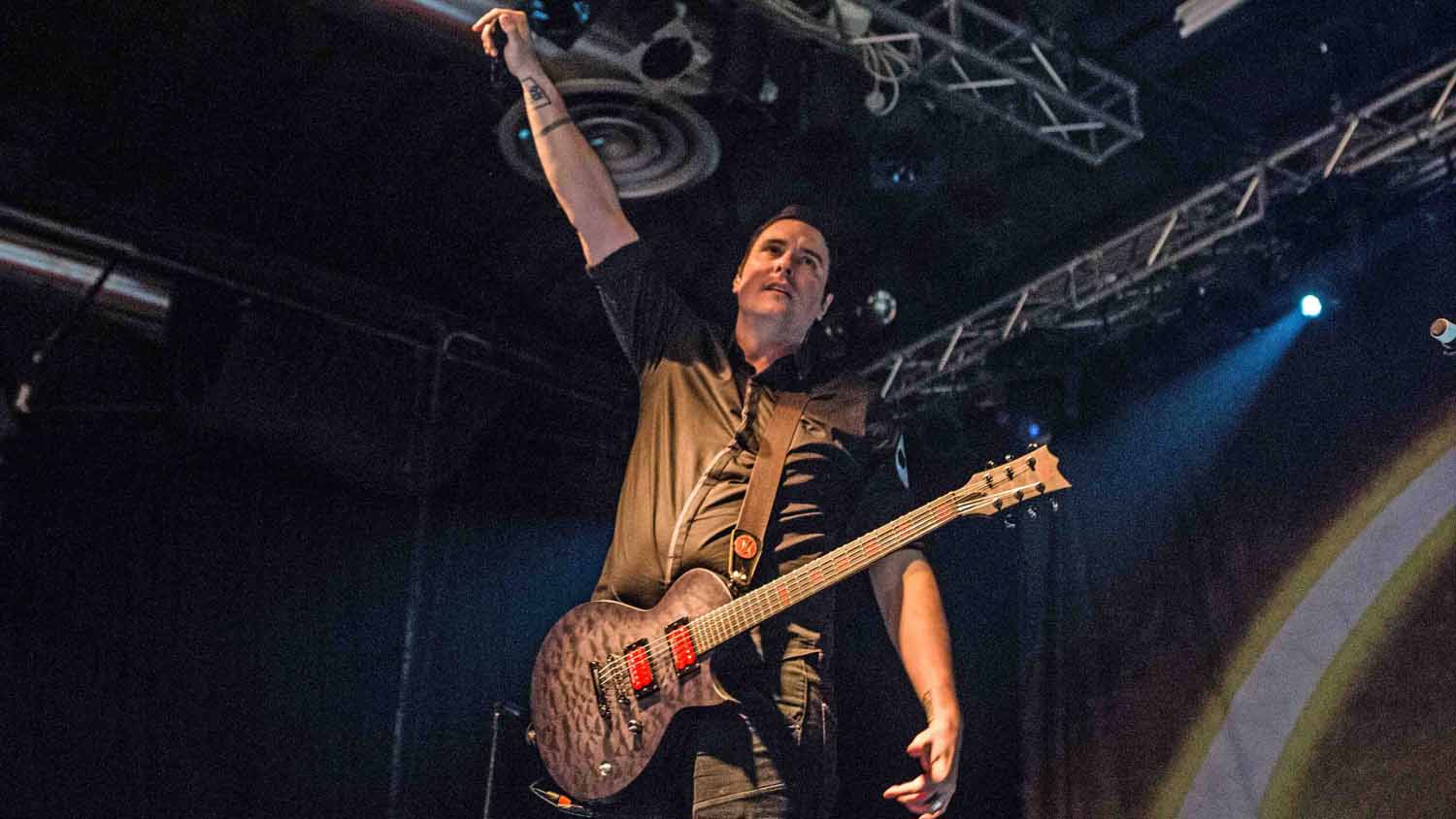
Yours sincerely
Selling truckloads of records, signature axes, embarking on brand new adventures… you could say now is a very exciting time for the founder and his new bandmates.
Maybe it’s time time to find out the secret to all that success. So how does he do it - what’s the Benjamin Burnley guide to achieving your musical goals?
“It all comes down to your songs,” he laughs, before a moment’s thought. “Look at Nirvana or Korn: they didn’t start off as the biggest bands in the world. They just started, and it all connected. No-one knew if they would take off, but look at how pure and organic their music was.
We’re not setting out to sell millions; we just wanna make music that feels sincere
“We’re not setting out to sell millions; we just wanna make music that feels sincere. I think that’s something people really attach to. You can’t fool them with insincerity…
“There are bands out there that I know are insincere, not only in their music but also as people, and it kinda sickens me,” shrugs Benjamin. “It makes me not want to be a musician, but I won’t let it pollute my path.
“We don’t dictate what other people should be doing; we just focus on what we do and give 100 per cent of ourselves to our fans… because they would do the same for us.”
Nine-day Transatlantic cruises aside, he might just be right.
Breaking Benjamin play Download Festival on Sunday 12 June.
Amit has been writing for titles like Total Guitar, MusicRadar and Guitar World for over a decade and counts Richie Kotzen, Guthrie Govan and Jeff Beck among his primary influences. He's interviewed everyone from Ozzy Osbourne and Lemmy to Slash and Jimmy Page, and once even traded solos with a member of Slayer on a track released internationally. As a session guitarist, he's played alongside members of Judas Priest and Uriah Heep in London ensemble Metalworks, as well as handling lead guitars for legends like Glen Matlock (Sex Pistols, The Faces) and Stu Hamm (Steve Vai, Joe Satriani, G3).
